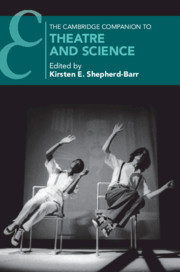Book contents
- The Cambridge Companion to Theatre and Science
- Cambridge Companions to Theatre and Performance
- The Cambridge Companion to Theatre and Science
- Copyright page
- Contents
- Illustrations
- Contributors
- Acknowledgements
- Introduction
- 1 Objectivity and Observation
- 2 Staging Consciousness
- 3 The Experimental/Experiential Stage
- 4 A Cave, a Skull, and a Little Piece of Grit
- 5 The Play at the End of the World
- 6 Bodies of Knowledge
- 7 Pathogenic Performativity
- 8 Theatres of Mental Health
- 9 Devised Theatre and the Performance of Science
- 10 Theatre and Science as Social Intervention
- 11 Acting and Science
- 12 Staging Cognition
- 13 Clouds and Meteors
- 14 ‘The Stage Hand’s Lament’
- Index
- References
12 - Staging Cognition
How Performance Shows Us How We Think
Published online by Cambridge University Press: 20 January 2021
- The Cambridge Companion to Theatre and Science
- Cambridge Companions to Theatre and Performance
- The Cambridge Companion to Theatre and Science
- Copyright page
- Contents
- Illustrations
- Contributors
- Acknowledgements
- Introduction
- 1 Objectivity and Observation
- 2 Staging Consciousness
- 3 The Experimental/Experiential Stage
- 4 A Cave, a Skull, and a Little Piece of Grit
- 5 The Play at the End of the World
- 6 Bodies of Knowledge
- 7 Pathogenic Performativity
- 8 Theatres of Mental Health
- 9 Devised Theatre and the Performance of Science
- 10 Theatre and Science as Social Intervention
- 11 Acting and Science
- 12 Staging Cognition
- 13 Clouds and Meteors
- 14 ‘The Stage Hand’s Lament’
- Index
- References
Summary
Chapter 12: This chapter shows how theatre operates as a kind of cognitive prosthetic, helping us stage and imagine what we are not yet able to see around us or within us. Committed to embodied and extended theories of cognition, the chapter examines the relationship between the stories told onstage across the centuries and the shifting conceptions of the self and the other. Through a kind of wormhole between King Lear, the pageant wagon of the medieval period, and the off-off-Broadway theatre of today, the chapter connects the theatrical innovations around personation, or the taking-on of a character, in these different periods to argue that the theatrical conventions that set up the relationship between character and actor display a changing notion of the self. This shifting of theatrical conventions generates discomfort at first, as spectators learn to consume stories in a new way; and the discomfort unveils what we need to learn next.
- Type
- Chapter
- Information
- The Cambridge Companion to Theatre and Science , pp. 176 - 187Publisher: Cambridge University PressPrint publication year: 2020
References
Suggested Reading
- 1
- Cited by

